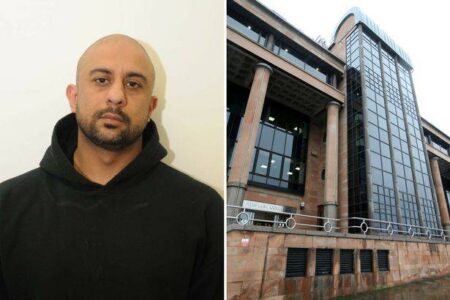
Terrorist prisoner Mohammed Zahir Khan challenging ‘discriminatory’ law stopping automatic release at High Court
A prisoner is challenging the government’s ban on automatic release for terror offenders, claiming it violates human rights.
Islamic State supporter Mohammed Zahir Khan was jailed for encouraging terror attacks in 2018 and was due to be freed in February before the rules changed.
His impending release provoked headlines describing a “race against time” to pass an emergency law that was announced by the government a day after the Streatham terror attack.
It was the third knife rampage in just over two months to be launched by a convicted terror offender, following the Fishmongers’ Hall attack in London Bridge and a stabbing by two inmates inside a high-security jail.
The suspect arrested over the Reading attack, where three victims were killed on Saturday, had been released from prison after serving a non terror-related sentence 16 days previously.
The Terrorist Offenders (Restriction of Early Release) Act 2020 came into force on 26 February – days before Khan’s scheduled release.
It was expected to block the automatic early release of around 50 people who had already been jailed for terror offences, and the government has subsequently proposed new laws aiming to keep terrorists in jail for longer.
The change forced offenders who had been given standard determinate sentences to serve two thirds of their sentence before being considered for release by the Parole Board, rather than being freed automatically at the half-way point.
Lawyers representing Khan say the terms of legislation breach human rights, are directed against people holding “particular Islamic beliefs” and have a “disproportionate impact” on Muslims.
Robert Buckland, the justice secretary, disagrees and lawyers representing the government are arguing for the challenge to be dismissed.
At a preliminary hearing in May, Mr Justice Garnham ruled that Khan had an “arguable case”.
Fellow High Court judges Lord Justice Fulford and Mr Justice Garnham began considering detailed arguments at a virtual hearing on Wednesday.
Hugh Southey QC, who is leading Khan’s legal team, told the court that new provisions breached the European Convention on Human Rights.
He argued that the Terrorist Offenders (Restriction of Early Release) Act 2020 violated the right to liberty, the right not to be held guilty of an offence which did not constitute an crime when it was committed, and the right not to suffer discrimination.
Mr Southey said the changes had produced “inconsistency” and led to terrorist prisoners being treated differently from other prisoners.
He claimed that judges should declare them incompatible with human rights legislation, but Sir James Eadie QC, leading Mr Buckland’s legal team, said Khan’s challenge should be dismissed.
He told the court the rules were not discriminatory, because they applied equally to all relevant terrorist offenders, regardless of race or religion.
As of 31 March, there were 238 people jailed for terror-related offences in the UK, of which 77 per cent were Islamists and 18 per cent far-right extremists.
Sir James said parliament was entitled to distinguish terrorist offenders because of the risks they posed, and the difficulties managing those risks.
Khan, 42, admitted five counts of encouraging terrorism, one count of disseminating terrorist publications and two counts of inciting religious hatred via his social media accounts.
He is originally from Birmingham but was a shopkeeper living in Sunderland when he was handed a four-and-a-half year prison sentence at Newcastle Crown Court in May 2018.
Khan, who had shared Isis propaganda and posted messages saying Shia Muslims should be burned alive, will be considered for release in November 2020 under the new regime.
The case will continue on Thursday. It comes as parliament considers a new raft of laws aimed at keeping terrorists in prison for longer.
Under the Counter-Terrorism and Sentencing Bill, judges would also be able to increase the sentence for any crime punishable by more than two years in prison by finding a “terrorist connection”.
The law would force terrorists given extended determinate sentences to serve the entire term in prison, rather than being released on licence, but only if the maximum penalty for the crime was life.
Legal changes would see those found guilty of selected offences, such as planning attacks, handed a minimum 14-year prison term and monitored for up to 25 years after their release under a new “serious terrorism sentence”.
They would also increase the maximum penalty from 10 to 14 years’ imprisonment for several terror offences, increase licence periods and introduce lie detector tests for released prisoners.
It comes amid concerns about Islamist radicalisation and networking in prisons, after a recent trial heard that convicted terrorists were free to exchange “jihad banter” and discuss attacks inside HMP Belmarsh.
A Ministry of Justice impact assessment for the new law said that while longer sentences could give terrorists more opportunity to engage in deradicalisation programmes, there “is a risk of offenders radicalising others during their stays in custody”.
Last year, the Parole Board warned that jailing low-level extremists can “result in them becoming more likely to commit terrorist acts when they are released”.
A 2016 report on Islamist extremism in prisons sparked the creation of separation centres to remove influential extremists from the general population, but only one of four units is now in operation.
Source: Independent





